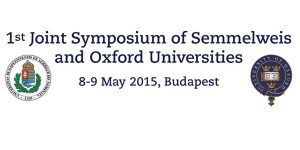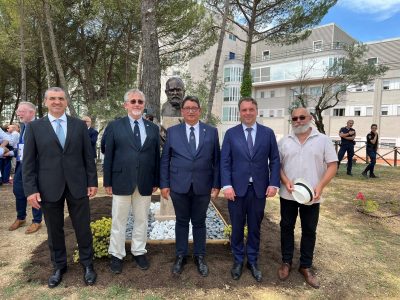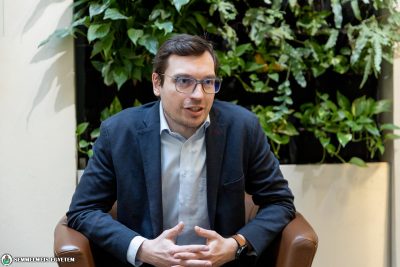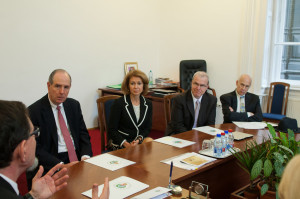 Details of a staff and student exchange programme were discussed during the visit of the delegation of the University of Massachusetts Medical School to Semmelweis University. Apart from the meeting with the Rector and the special Researchers’ Salon, the representatives of the two institutions also participated in the conferment ceremony of Dr. Gyöngyi Szabó at the Hungarian Academy of Sciences.
Details of a staff and student exchange programme were discussed during the visit of the delegation of the University of Massachusetts Medical School to Semmelweis University. Apart from the meeting with the Rector and the special Researchers’ Salon, the representatives of the two institutions also participated in the conferment ceremony of Dr. Gyöngyi Szabó at the Hungarian Academy of Sciences.
The UMMS delegation consisted of Dr. Michael Collins, chancellor of UMMS, Dr. Terrence Flotte, vice-chancellor and dean of the School of Medicine, Dr. Gyöngyi Szabo, director of the MD/PhD programme and Dr. Robert Finberg, chair of the Department of Medicine. Dr. Ágoston Szél, rector of Semmelweis University, mentioned that the chancellor system has been recently introduced to Hungarian universities as well; therefore the two leaders also discussed how the chancellor system functions in the United States.
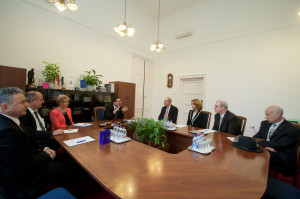 During the meeting Dr. Mária Judit Molnár gave an account of the results of the trip made to UMMS with Dr. Marcel Pop, director of international relations. According to her, it is important to extend the agreement to include the exchange of PhD students which is supported by the American partner as well.
During the meeting Dr. Mária Judit Molnár gave an account of the results of the trip made to UMMS with Dr. Marcel Pop, director of international relations. According to her, it is important to extend the agreement to include the exchange of PhD students which is supported by the American partner as well.
Based on the agreement two medical students, two PhD students and one staff member may spend 2-4 weeks at either the UMMS or Semmelweis University.
The parties also discussed integrated curriculums: at the UMMS nursing and medical students have been registering jointly to certain courses for 5 years now – the summary of this initiative will be made available to Semmelweis University. Experience will also be shared concerning the establishment of the Research and Innovation Center in Massachusetts.
Dr. Mária Judit Molnár welcomed the guests at the special Researchers’ Salon which was integral part of the UMMS delegation’s visit. She emphasised that the event is very unique since it provides the participants with the possibility to gain insight into the research activities of the American university. Dr. Ágoston Szél – referring to the presentation of Dr. Michael Collins on academic health centres – emphasised that the topic is very important since Semmelweis University also considers it a priority to keep the clinics integrated with the university and to preserve the union of education, research and healthcare.
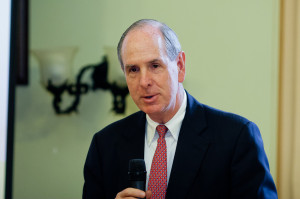 Dr. Michael Collins underlined in his speech that the UMMS is a world renowned University and they are proud to have a Nobel laureate among the staff. Dr. Craig C. Mello received a shared Nobel Prize for Physiology or Medicine for discovering the RNA interference. The Chancellor emphasised that the university’s leadership travels all around the world thanks to the UMMS’ extensive international relations and its excellent reputation; nevertheless, their relationship with Semmelweis is uniquely strong and well-developed. According to the Chancellor, Semmelweis University has always been a great influence for him: the leadership, the academic staff, the education and the infrastructure all offer very promising possibilities for cooperation which can profit the UMMS as well.
Dr. Michael Collins underlined in his speech that the UMMS is a world renowned University and they are proud to have a Nobel laureate among the staff. Dr. Craig C. Mello received a shared Nobel Prize for Physiology or Medicine for discovering the RNA interference. The Chancellor emphasised that the university’s leadership travels all around the world thanks to the UMMS’ extensive international relations and its excellent reputation; nevertheless, their relationship with Semmelweis is uniquely strong and well-developed. According to the Chancellor, Semmelweis University has always been a great influence for him: the leadership, the academic staff, the education and the infrastructure all offer very promising possibilities for cooperation which can profit the UMMS as well.
Dr. Collins talked about the challenges and opportunities of the American academic healthcare system and medical education. Dr. Terrence Flotte, vice-chancellor discussed the most topical questions of gene therapy while Dr. Robert Finberg gave the audience a global overview of influenza with special regard to viral sequences.
Following the Researchers’ Salon the leadership of the UMMS and SE participated in Dr. Gyöngyi Szabó’s conferment ceremony at the Hungarian Academy of Sciences.
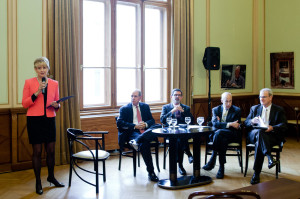 Semmelweis University and the University of Massachusetts Medical School signed a Memorandum of Understanding in 2011 which was preceded by more than ten years of professional and scientific cooperation. Dr. Gyöngyi Szabó and Dr. Zsolt Tulassay from SE’s 2nd Department of Internal Medicine worked together in the fields of gastroenterology and PhD education. Dr. Szabó put forward the Memorandum during her visit in late May, 2011 which formalised the long-standing cooperation. Since then a special committee at Semmelweis University works on the identification of additional areas of collaboration. The Committee consists of Dr. Péter Kanizsai, Dr. Ádám Tárnoki, Dr. Dávid Tárnoki and is headed by Dr. Dániel Bereczki.
Semmelweis University and the University of Massachusetts Medical School signed a Memorandum of Understanding in 2011 which was preceded by more than ten years of professional and scientific cooperation. Dr. Gyöngyi Szabó and Dr. Zsolt Tulassay from SE’s 2nd Department of Internal Medicine worked together in the fields of gastroenterology and PhD education. Dr. Szabó put forward the Memorandum during her visit in late May, 2011 which formalised the long-standing cooperation. Since then a special committee at Semmelweis University works on the identification of additional areas of collaboration. The Committee consists of Dr. Péter Kanizsai, Dr. Ádám Tárnoki, Dr. Dávid Tárnoki and is headed by Dr. Dániel Bereczki.
The parties also signed a detailed work plan in April, 2014 following several high-level bilateral visits.
In September 2014, Dr. Mária Judit Molnár, vice-rector for scientific affairs and Dr. Marcel Pop, director of international relations visited the partner institution in Massachusetts to further concretise the areas of cooperation where the parties agreed to launch a professional exchange programme.
Pálma Dobozi, Bonifac Makkai
Photos: Attila Kovács – Semmelweis University
